Are weeds deteriorating your outdoor garden space?
This is a common problem faced by people with gardens and farms, and it becomes necessary to eliminate them.
Vinegar has emerged as a strong contender in the search for natural and environment-friendly weed control options.
People looking for non-chemical herbicides frequently choose it because of its acetic acid concentration.
This acetic acid concentration can help in ceasing weed growth.
We will explore the subtleties of vinegar’s weed-killing properties, its efficiency, and how it works.
You will also gain insights into employing vinegar for weed control if you are unfamiliar with the method.
Does Vinegar Kill Weeds Permanently?
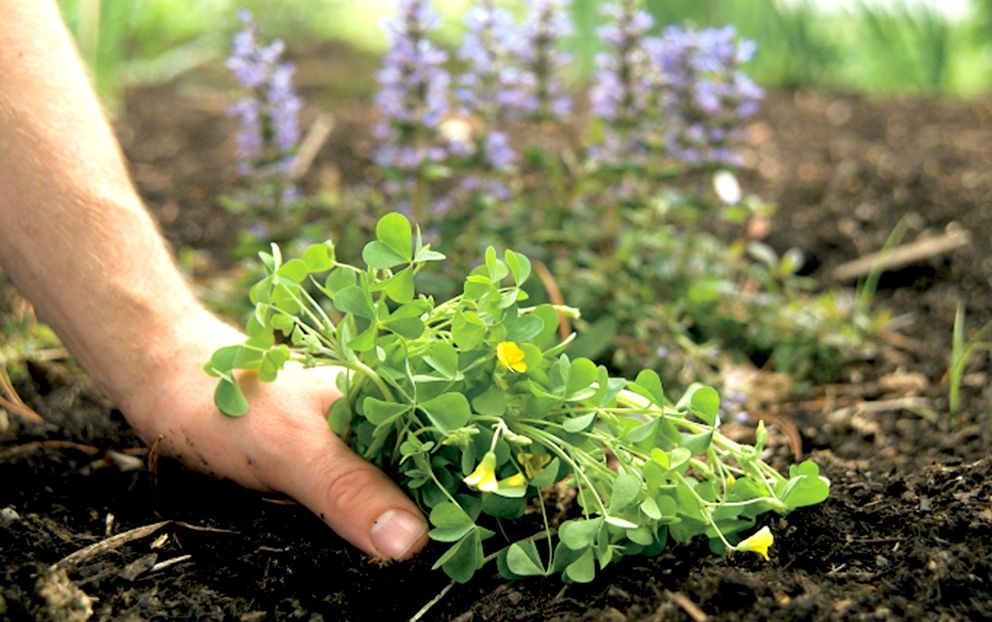
People who wish to maintain a clean and visually pleasing garden or outer space commonly struggle with weeds.
Many choose natural herbicides instead of synthetic ones, and Vinegar is one such effective option.
Acetic acid, a naturally occurring substance recognized for its herbicidal qualities, is a component of vinegar, especially white distilled vinegar.
When vinegar is given to plants, it alters the structure and operations of the cells, causing desiccation and, eventually, killing the plant.
As a result, Vinegar has the potential to be used as a technique to manage weeds in garden areas and other places.
Effects of Vinegar on Weeds
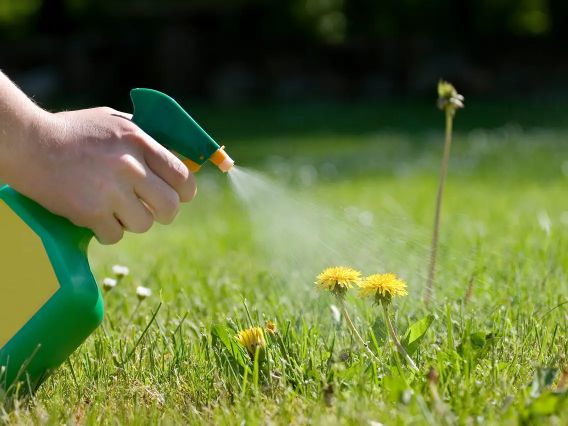
Direct application of Vinegar to weeds, especially the young and delicate ones, frequently results in their quick death.
Due to the rapid action of the acetic acid, plant tissues wither and perish within hours or a few days.
This works well for young weed plants with a shallow root system.
However, you must also understand that vinegar does not work selectively; it will kill all the plants, even the ones you wish to keep.
Does Vinegar Have a Long-Term Effect on Weeds?
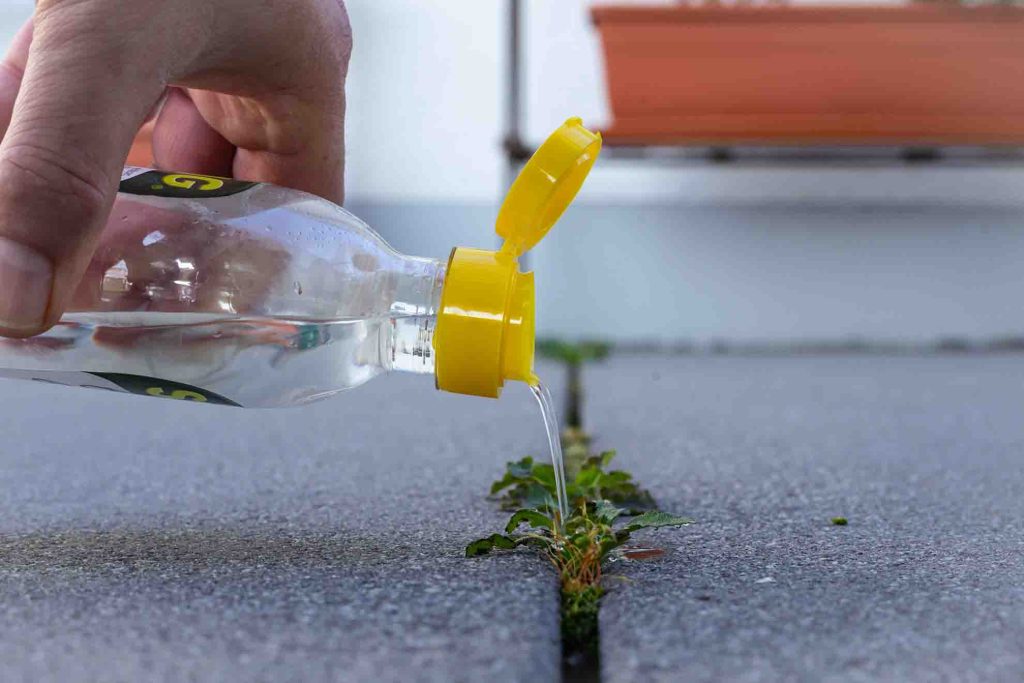
Vinegar is an effective measure to treat weeds, but will it permanently kill them?
Annual weeds are particularly vulnerable to the effects of vinegar since they can complete their whole life cycle in a single season.
Because of their shallow root systems, they are less likely to grow again after Vinegar treatment.
This can offer a comparatively long-lasting remedy for locations vulnerable to yearly weed infestations.
However, perennial weeds are harder to grow since they develop across several growing seasons and frequently have broad and deep root systems.
While Vinegar can harm the plant’s surface, it might not destroy the roots.
The perennial weeds may gradually come back and thus require repeated sprays.
Guide: Vinegar for Killing Weeds Effectively
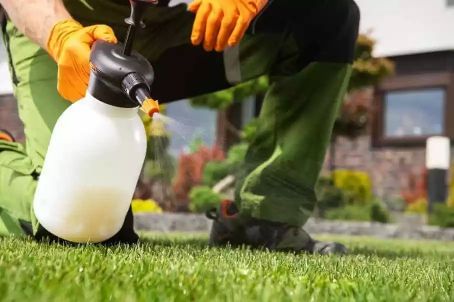
White distilled vinegar is particularly effective for killing weeds, but you must also learn how to use it properly to get the desired results.
- You should first collect the required supplies, which include White distilled vinegar with a concentration of about 10% acetic acid, a spray bottle or pump sprayer, and eye and body protection clothing.
- A sunny day with warm temperatures will be a good environment for spraying vinegar on the weeds with little to no wind. Sunlight can enhance the effectiveness of the vinegar. Prepare the vinegar solution as per the requirement and handle it carefully.
- Use the vinegar solution to fill your spray can, bottle, or whatever you use. Protect your eyes, skin, and other exposed areas before you spray the solution on the weeds.
- Spray the vinegar mixture directly onto the weeds, covering them completely. Concentrate on the foliage and stems, as the acetic acid will work best there. Also, ensure that you only spray the solution on weeds, as it can kill every plant, even your desired ones.
- You will start to notice the weeds withering and browning within a few hours to a day. This shows that vinegar efficiently alters the plant’s cell structure. For more hardy and deeper roots, you might need to apply the weeds with a second or even a third application.
For detailed steps on how to use vinegar to kill weeds, refer to our comprehensive guide.
Follow all these steps properly, and you will see the desired results quickly.
Wrapping Up
If you don’t want to disrupt your vegetation or house garden, Vinegar is a perfect, effective, and natural source for killing and completely eradicating weeds.
You know how vinegar must be applied to the weeds and how effectively it will work on different weed plants.
This surely works, and if you haven’t tried this method to kill the weeds in your planting areas, do give it a shot.
This method will be most effective when you follow the steps carefully and precisely, as discussed above, and take all the precautions to keep yourself safe.
You may even seek help if you are trying this mode for the very first time and want to get rid of all the weeds for an amazing garden.
Frequently Asked Questions
How Long Does It Take Vinegar to Kill Weeds?
A vinegar solution with the required amount of concentration will have the ability to kill weeds within the initial 24 hours of its application.
It sometimes may even take about 2-3 days for complete eradication.
Also, this solution works well on annual weeds with shorter root systems than perennial ones.
What Kind of Vinegar Kills Weeds Permanently?
White Vinegar, with an acetic acid content of about 5%, is best for killing weeds.
If you add this solution to a spray bottle and use it on the weeds, it will eradicate all the unwanted plants.
Also, you should be aware that Vinegar solution will kill any plant it is spayed upon, so make sure that you carefully use it on weeds only.

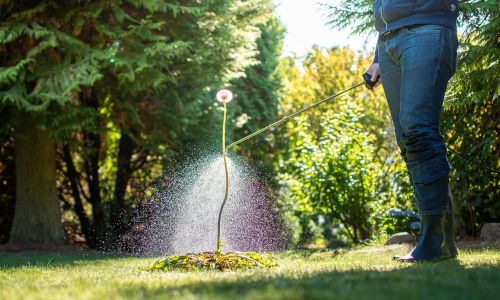

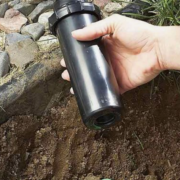
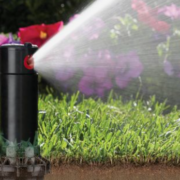
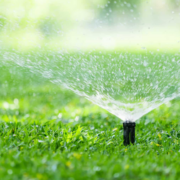


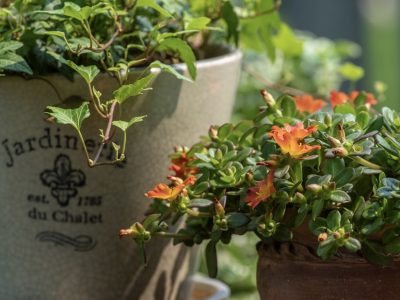
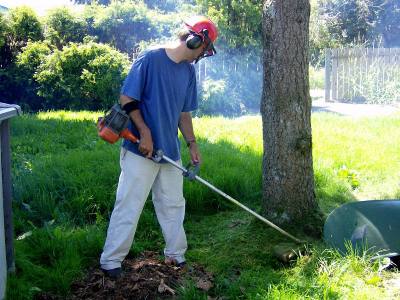
Comments